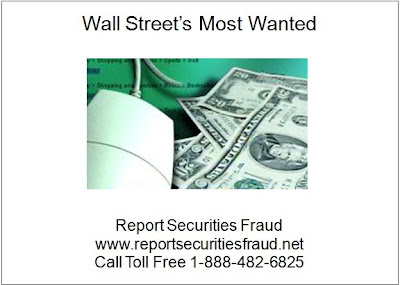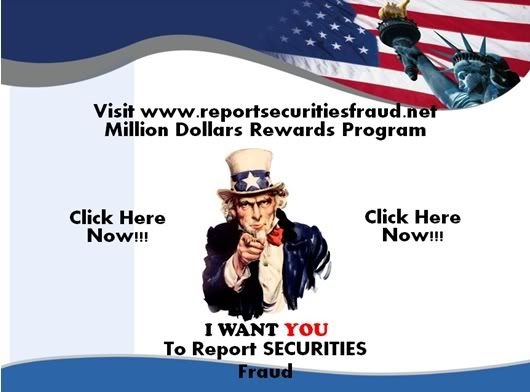
Source-
http://www.sec.gov/news/press/2012/2012-199.htm
Washington, D.C., Sept. 27, 2012 – The Securities and Exchange Commission today charged Goldman, Sachs & Co. and one of its former investment bankers with “pay-to-play” violations involving undisclosed campaign contributions to then-Massachusetts state treasurer Timothy P. Cahill while he was a candidate for governor.
Pay-to-play schemes involve campaign contributions or other payments made in an attempt to influence the awarding of lucrative public contracts for securities underwriting business. This marks the first SEC enforcement action for pay-to-play violations involving “in-kind” non-cash contributions to a political campaign.
According to the SEC’s order against Goldman Sachs, Neil M.M. Morrison was a vice president in the firm’s Boston office and solicited underwriting business from the Massachusetts treasurer’s office beginning in July 2008. Morrison also was substantially engaged in working on Cahill’s political campaigns from November 2008 to October 2010. Morrison at times conducted campaign activities from the Goldman Sachs office during work hours and using the firm’s phones and e-mail. Morrison’s use of Goldman Sachs work time and resources for campaign activities constituted valuable in-kind campaign contributions to Cahill that were attributable to Goldman Sachs and disqualified the firm from engaging in municipal underwriting business with certain Massachusetts municipal issuers for two years after the contributions. Nevertheless, Goldman Sachs subsequently participated in 30 prohibited underwritings with Massachusetts issuers and earned more than $7.5 million in underwriting fees.
While the SEC’s case against Morrison continues, Goldman Sachs agreed to settle the charges by paying $7,558,942 in disgorgement, $670,033 in prejudgment interest, and a $3.75 million penalty, which is the largest ever imposed by the SEC for Municipal Securities Rulemaking Board (MSRB) pay-to-play violations. The SEC coordinated this enforcement action with a related action filed by the Massachusetts Attorney General against Goldman Sachs.
“The pay-to-play rules are clear: municipal finance professionals that use their firm’s resources to campaign on behalf of political candidates compromise themselves and the firms that employ them,” said Robert Khuzami, Director of the SEC’s Division of Enforcement.
Elaine C. Greenberg, Chief of the SEC Enforcement Division’s Municipal Securities and Public Pensions Unit, added, “Fighting efforts to improperly influence the underwriting selection process is one of the unit’s top priorities. These practices result in undisclosed conflicts of interest and undermine public confidence in the integrity of the municipal securities market.”
According to the SEC’s orders against Morrison and Goldman Sachs, among the campaign activities that Morrison engaged in for Cahill were fundraising, drafting speeches, communicating with reporters, approving personnel decisions, and interviewing at least one possible running mate. Morrison at times referenced his campaign work while soliciting underwriting business in an apparent attempt to curry favor during the selection process. Morrison sent e-mails to a deputy treasurer in Cahill’s office making the following statements while discussing the selection of underwriters:
“The boss [Cahill] mentioned to me this morning that he spoke to [the Assistant Treasurer] and that it is looking good for us [Goldman Sachs] on the build America bond deal.”
“From my standpoint as an advisor/consultant/friend I am saying, PLEASE don’t give these [underwriter] slots away willy-nilly. You are in the fight of your lives and need to reward loyalty and encourage friendship. If people aren’t willing to be creative with their support then they shouldn’t expect business. This has to be a political decision.”
“We have discussed the Build American Bond transaction and how important it is to me. You have been great keeping me up to speed. This is my number 1 priority and most important ask. Having Goldman as the lead and getting 50% of the economics would be such a home run for me.”
According to the SEC’s orders, in addition to his direct campaign work for Cahill, Morrison made an indirect cash contribution to Cahill by giving cash to a friend who then wrote a check to the Cahill campaign. Morrison’s campaign work and his indirect financial contribution created a conflict of interest that was not disclosed by Goldman Sachs in the relevant municipal securities offerings in violation of pay-to-play rules. Morrison himself acknowledged the existence of this conflict in an e-mail to a campaign official, saying, “I am staying in banking and don’t want a story that says that I am helping Cahill, who is giving me banking business. If that came out, I’m sure I wouldn’t get any more business.”
According to the SEC’s orders against Goldman Sachs and Morrison, Goldman Sachs terminated Morrison in December 2010.
The SEC’s order against Goldman Sachs found that the firm violated Section 15B(c)(1) of the Exchange Act and MSRB Rule G-37(b), which prohibits firms from underwriting offerings for municipal issuers within two years after any contribution to an official of such issuer. The SEC’s order found that Goldman Sachs did not disclose any of the contributions on MSRB Forms G-37, and did not make or keep records of the contributions in violation of MSRB Rules G-37(e), G-8 and G-9. The order found that Goldman Sachs did not take steps to ensure that the attributed contributions or campaign work or the conflicts of interest raised by them were disclosed in the bond offering documents, in violation of MSRB Rule G-17, which requires broker-dealers to deal fairly and not engage in any deceptive, dishonest, or unfair practice. The order found that Goldman Sachs failed to effectively supervise Morrison in violation of MSRB Rule G-27.
Goldman Sachs consented to the SEC’s order without admitting or denying the findings. In addition to paying disgorgement, prejudgment interest, and the penalty, Goldman Sachs agreed to be censured and to cease and desist from committing or causing any violations and any future violations of the provisions referenced in the order.
In its order against Morrison, the SEC’s Enforcement Division alleges that Morrison violated MSRB Rule G-37(d) by making a secret, undisclosed cash campaign contribution to Cahill, that he violated MSRB Rule G-37(c) by soliciting campaign contributions for Cahill, and that he violated MSRB Rule G-17 by failing to disclose conflicts of interest to the purchasers of municipal securities. The Division of Enforcement further alleges that Morrison caused Goldman Sachs to violate Rule G-8, Rule G-9, Rule G-37(b) and Rule G-37(e).
************************************************************************
Report Securities Fraud by Calling 1-888-482-6825 or by visiting
www.reportsecuritiesfraud.net






























